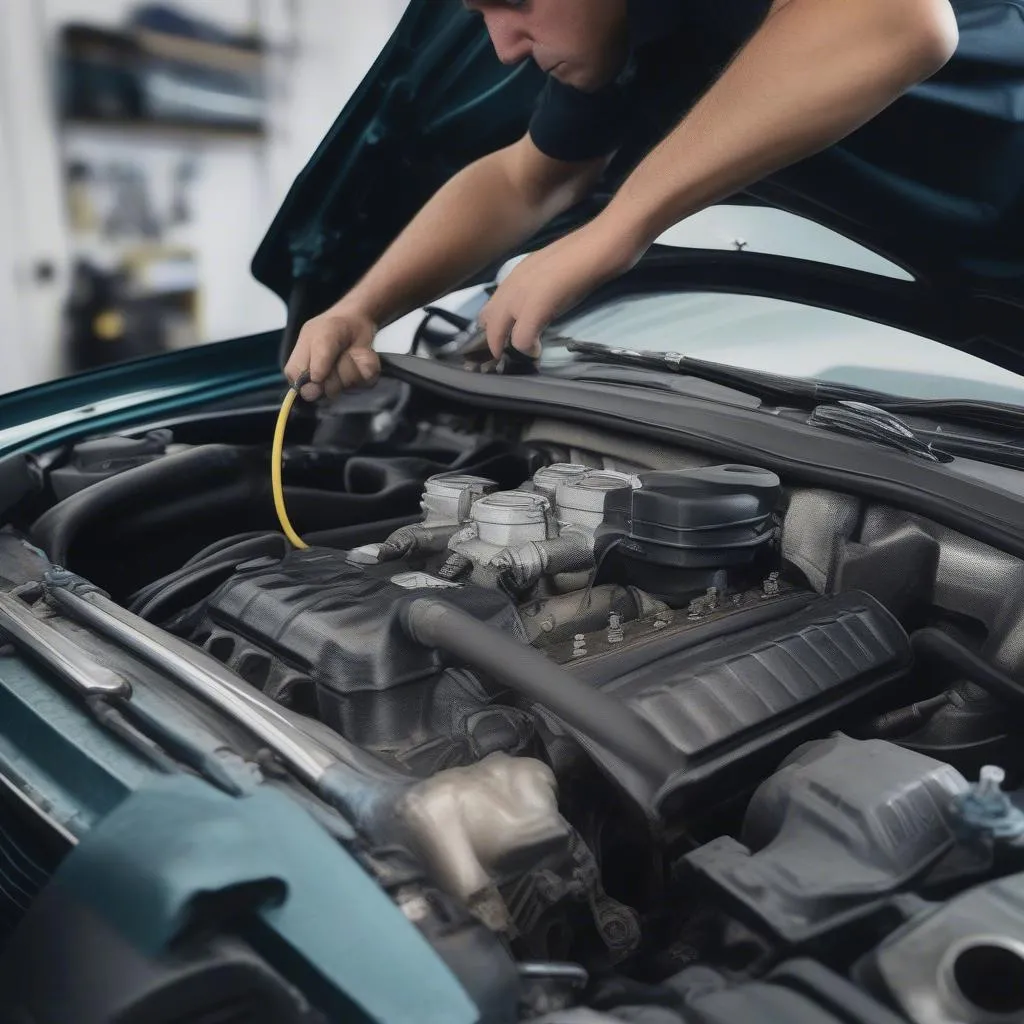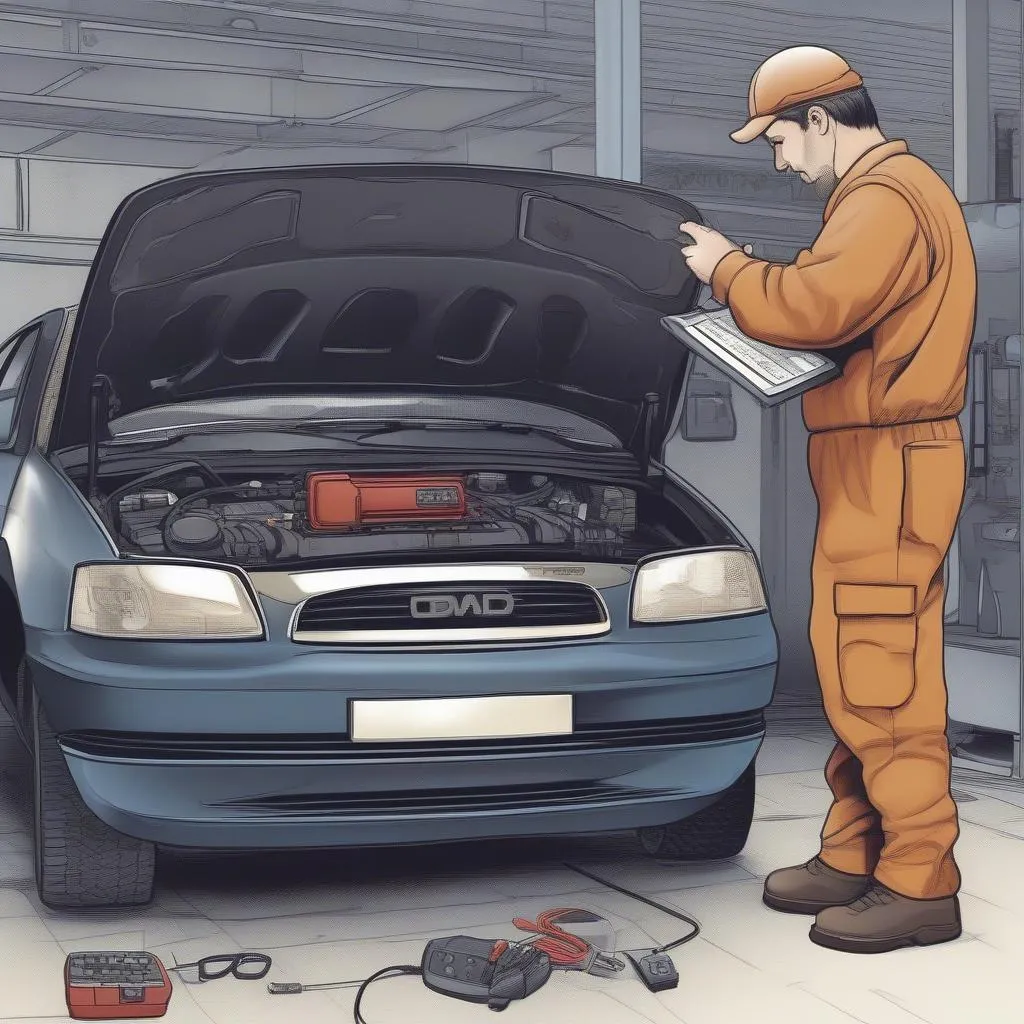Imagine this: You’re cruising down Route 66 in your trusty 2000 Ford Mustang GT, the wind in your hair, when suddenly, the check engine light throws a wrench in your road trip. You pull over, grab your trusty OBD-II reader (you can find some great recommendations for Ford OBD-II readers in our previous article), and it spits out the cryptic code “P0174.” What does it mean? Don’t panic! This scenario is more common than you think.
This article will break down everything you need to know about the P0174 OBD code, specifically on a 2000 Ford, and guide you toward getting your beloved vehicle back on the road.
Understanding the P0174 Code
What the Experts Say
“The P0174 code signals a ‘System Too Lean (Bank 2)’ condition,” explains John Miller, a veteran mechanic with over 20 years of experience at a Ford dealership in Chicago, Illinois. “In simpler terms, it means your engine is not getting enough fuel or too much air, creating a lean fuel-air mixture in the second cylinder bank.”
Why Does This Matter?
A lean fuel-air mixture can lead to various issues, ranging from:
- Reduced engine performance: Your Ford might feel sluggish and lack its usual power.
- Rough idling: You might notice the engine vibrating more than usual, especially when the car is stationary.
- Increased emissions: A lean mixture burns hotter and can damage your catalytic converter, leading to failed emissions tests.
- Engine damage: In extreme cases, prolonged driving with a lean mixture can cause severe damage to your engine.
Common Causes of P0174 in 2000 Ford Vehicles
While the P0174 code points to a lean fuel-air mixture, various culprits could be behind it. Here are some of the most common reasons why this code pops up in 2000 Ford models:
1. Vacuum Leaks
A vacuum leak in your engine’s intake manifold or hoses can disrupt the carefully calibrated air-fuel ratio, leading to a lean condition.
2. Faulty Oxygen Sensors (O2 Sensors)
Oxygen sensors are vital for informing your car’s computer about the fuel-air mixture. A malfunctioning O2 sensor, especially downstream of the catalytic converter, can send incorrect signals, causing the P0174 code.
3. Dirty or Defective Mass Air Flow (MAF) Sensor
The MAF sensor measures the amount of air entering the engine. A dirty or faulty MAF sensor can misread the airflow, leading to an incorrect air-fuel mixture.
4. Fuel Delivery Problems
Issues with your fuel pump, fuel filter, or fuel injectors can restrict fuel flow to the engine, creating a lean condition.
5. Exhaust Leaks
Similar to vacuum leaks, exhaust leaks, especially before the oxygen sensors, can also disrupt the air-fuel ratio and trigger the P0174 code.
Troubleshooting and Fixing the P0174 Code
Finding the root cause of the P0174 code often requires a systematic approach:
- Visual Inspection: Start by visually inspecting your engine bay for any loose or cracked vacuum hoses, disconnected wires, or signs of damage.
- Check for Vacuum Leaks: Use a carburetor cleaner or brake cleaner to spray around the intake manifold and vacuum hoses while the engine is running. A change in engine idle speed indicates a vacuum leak.
- Inspect and Test Sensors: Use an OBD-II scanner or a multimeter to test the functionality of your oxygen sensors and MAF sensor.
- Fuel System Check: Check the fuel pressure with a fuel pressure gauge to ensure the fuel pump is delivering adequate pressure. Also, inspect the fuel filter for clogs.
- Exhaust System Inspection: Look for any signs of cracks or leaks in the exhaust manifold, pipes, or catalytic converter.
Remember, while some of these steps might seem straightforward, it’s best to consult a qualified mechanic, especially if you’re uncomfortable working on your vehicle.
 Engine bay inspection
Engine bay inspection
Frequently Asked Questions about P0174 Code
Here are some questions Ford owners often have about the P0174 code:
Can I still drive my car with a P0174 code?
While driving short distances with the P0174 code might be possible, it’s not recommended. Prolonged driving with a lean fuel-air mixture can lead to severe engine damage.
How much does it cost to fix the P0174 code?
The repair cost depends on the underlying cause. Simple fixes like replacing a vacuum hose might cost under $100, while replacing a faulty oxygen sensor or fuel pump can cost several hundred dollars.
Can I fix the P0174 code myself?
If you’re mechanically inclined and have the necessary tools, you can attempt some basic troubleshooting steps like checking for vacuum leaks or cleaning the MAF sensor. However, it’s best to leave more complex repairs to professionals.
 OBD-II scanner
OBD-II scanner
Need More Help?
Dealing with car trouble can be frustrating, but remember, you’re not alone! For personalized guidance and expert support in diagnosing and fixing your car’s P0174 code, our team of automotive specialists is just a message away. Contact us on WhatsApp at +84767531508 for assistance with diagnostic tools and expert advice.
Explore More
For a comprehensive list of OBD-II codes for 2000 Ford Ranger models, check out our dedicated article: 2000 Ranger OBD-II Code List.
